The Checker Maven
A Small Change

So, in order to maintain consistency and predictability year-round, and to help manage our publication workload while still providing quality content, we're going to a permanent Saturday-morning schedule. We're dropping our Wednesday editions in favor of providing more on Saturdays.
This means that during summer and holiday periods, you'll still see a weekly Saturday article. During the regular parts of the year, you'll see at least one article and possibly two or three, as our time, energies, and backlog allow.
We hope this small change will prove pleasing, and invite your comments.
In the Grand Manner

Along with the Grand Old Game, there is little that is as wonderful as Grand Opera, performed by a truly world class company such as we are privileged to have here in Santa Fe.
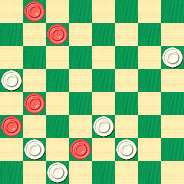
White
White to Play and Win
Just a word of caution: today's problem is "grand" in terms of difficulty as well as content. If you solve it, congratulations --- you might wish to reward yourself with a front row seat at the Santa Fe Opera!
[Read More]The Checker Maven is Looking for Stringers

Now, we know that up-to-the-minute tournament results and standings are generally posted on the Checker Solutions BBS (see link at left), or on specific websites. We're not looking to compete or "double up" in this area, and we're not looking to publish games, play, or analysis without proper permissions and clearances. We know that in a number of cases, game scores are kept in reserve for contributors.
However, having said all that, if you're in a position to provide us with timely news, play, or commentary from checker events, and doing so wouldn't be in conflict with what we've stated above, your contributions would be heartily welcomed. Full credit would be given, and in return you can have any share you want of our subscription fees. (Let's see, we learned in school that any number times zero is ....)
We hope to hear from you!
Welcome to Checker School
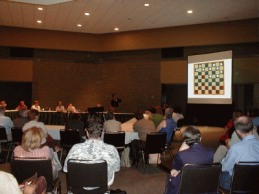
Let's get started with a delicate endgame of a very practical nature. Class is in session!
WHITE
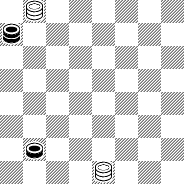
BLACK
Black to Play and Draw
Click on Read More for the solution, a runup to the position, and additional notes and quotes from Famous Positions.
(Editor's Note: the color diagrams will return as soon as we work through our article backlog.)
[Read More]Three Easy Strokes, Part Three
Here's the last of our "easier" stroke problems, at least in this series. Will you find this one to be a July cruiser, or something more? Solve it, check your solution by clicking Read More, and then prepare yourself --- next month's problem is going to be a summer scorcher.
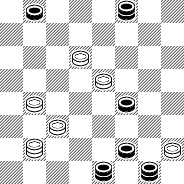
WHITE
White to Play and Win
Two Easy Pieces: Sixth Edition
Willie Ryan's classic Tricks Traps & Shots of the Checkerboard, presented here in a new electronic edition, is up to the sixth installment. Here's what Willie has to say on page 16 of the book.
BLACK
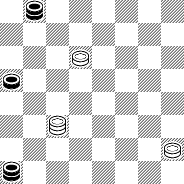
WHITE
White to Play and Win
BLACK
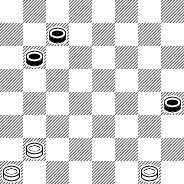
WHITE
White to Play and Win
You can check your solutions by clicking on Read More.
[Read More]Checker-Go-Round

Click on Read More to check your solutions.
(We are always in need of speed problems. If you have any that you'd like us to publish, please contact us using the contact link in the left column.)
Problem 1. Very easy.
Problem 2. Easy.
[Read More]